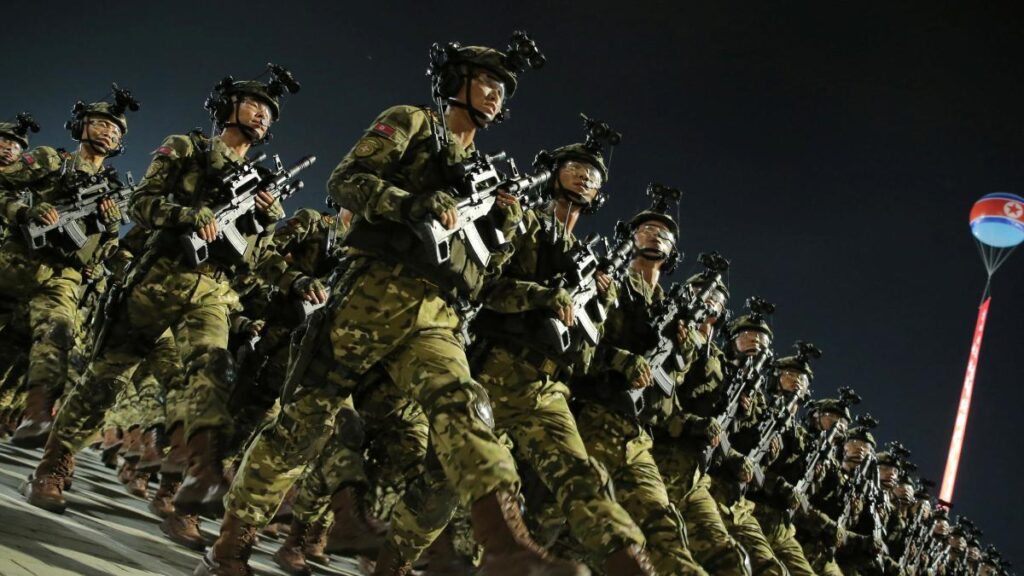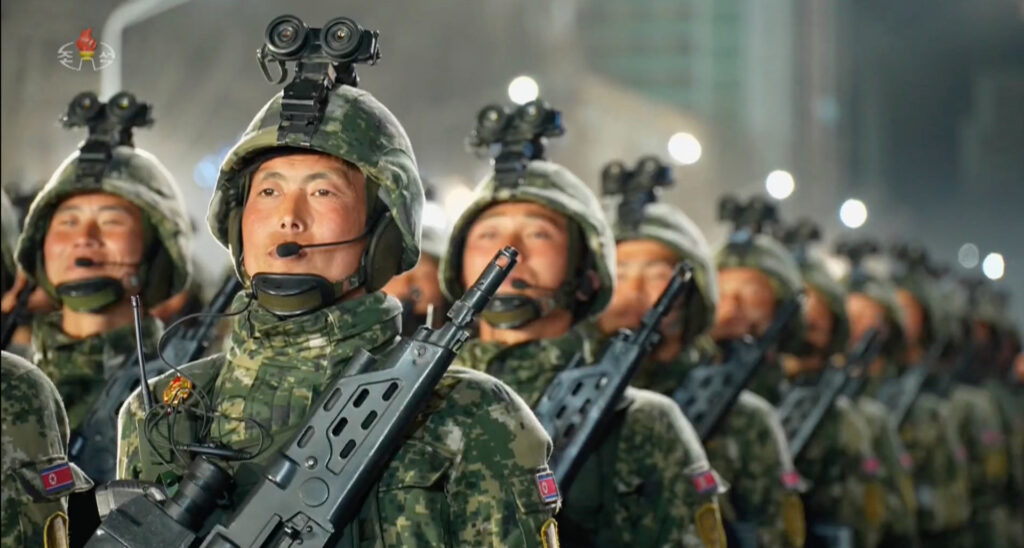The presence of North Korean troops Kursk has become a topic of intrigue and speculation, especially as North Korea continues to play an ambiguous role in international military affairs. From rumors about North Korean soldiers stationed in the Russian city of Kursk to reports of North Korean defections, and even mercenaries operating abroad, these issues have raised questions about North Korea’s global military ambitions and its relationships with other countries, particularly Russia. Additionally, the ongoing tension between North Korea and South Korea, as well as the geopolitical strategies involving the U.S. and Putin, further complicate the picture.
In this article, we will explore the speculated involvement of North Korean troops in Kursk, delve into North Korea’s broader military activities, examine the reported defections, and discuss the potential implications for global security.
North Korean Troops Kursk: Fact or Speculation?
The term North Korean troops in Kursk began circulating amid rising speculation about North Korea’s involvement in Russia’s military activities. Kursk, a city in western Russia, is historically known for its significance in World War II due to the Battle of Kursk, but recent reports suggest that it may now be a site of strategic importance for Russia’s modern military operations. Rumors indicate that North Korean soldiers may be present in the region, either assisting Russian troops or working as part of mercenary groups. These speculations have yet to be verified by major international bodies, leading to questions about the accuracy of such reports.
The suggestion of North Korean involvement in Russia’s military ventures comes at a time when Russia has faced challenges due to its involvement in Ukraine. With Moscow seeking potential allies, the idea of North Korea providing military assistance to Russia, directly or indirectly, has raised eyebrows. While the presence of North Korean troops in Kursk remains unconfirmed, it highlights the evolving nature of military alliances and the shadowy world of mercenary forces.
Read Also: north korean troops kursk
North Korean Defections and Military Desertions
The concept of North Korean troops defecting has long been a point of interest for intelligence agencies and governments. North Korean defectors, particularly those from the military, can provide invaluable insight into the inner workings of the country’s tightly controlled regime. Defections often occur at the North Korea-South Korea border, though some reports suggest that defectors have also managed to escape while on foreign assignments, including those stationed in Russia.
For North Korean soldiers, defection is a dangerous choice. The North Korean regime is known for its strict surveillance and harsh punishment of those attempting to escape. Despite this, there have been instances of soldiers successfully defecting, and their stories often reveal shocking details about life inside North Korea’s military, from poor living conditions to a lack of basic resources.
If North Korean soldiers are indeed stationed in places like Kursk, the possibility of defection becomes more likely, especially given the difficulties that may arise from operating in unfamiliar and potentially hostile environments. However, any North Korean troops defecting from such positions would face considerable risk, not only from the North Korean regime but also from Russian authorities.
North Korean Mercenaries: Myth or Reality?
In recent years, reports have surfaced about North Korean mercenaries operating in various conflict zones across the globe. North Korea, known for its secretive and isolated government, has historically relied on unconventional means to raise funds and maintain its military prowess. One such method may involve offering mercenary services, with soldiers trained by the regime allegedly being sent abroad to participate in foreign conflicts for profit.
The idea of North Korean mercenaries operating outside their homeland has gained attention in the context of conflicts involving Russia. Some experts believe that North Korean soldiers may have been sent to Russia, particularly to areas like Kursk, as part of mercenary groups supporting Moscow’s military objectives. This arrangement would provide North Korea with financial benefits and an opportunity to showcase its military capabilities on a global stage, all while maintaining a degree of plausible deniability.
While concrete evidence of North Korean mercenary activities remains elusive, the possibility cannot be entirely dismissed given North Korea’s history of unconventional military strategies.

The Broader Geopolitical Context: North Korea, South Korea, the U.S., and Putin
North Korea’s military activities are inextricably linked to the broader geopolitical tensions in the region and beyond. The longstanding conflict between North Korea and South Korea continues to shape military strategies on both sides of the Korean Peninsula. North Korea’s continued development of nuclear weapons and missile technology has heightened tensions, particularly with South Korea and its ally, the United States.
At the same time, North Korea’s relationship with Russia has grown more complex in recent years. While the two nations were once close allies during the Cold War, their relationship has since cooled. However, with Russia facing increasing isolation on the international stage due to its actions in Ukraine, there is speculation that Moscow may seek to rekindle its ties with Pyongyang. Reports of North Korean troops in Kursk and other forms of military cooperation could signal a shift in the relationship between the two nations, as Russia looks for new allies to bolster its military capabilities.
North Korean leader Kim Jong-un’s relationship with Russian President Vladimir Putin also plays a role in this dynamic. The two leaders have met on several occasions, discussing economic and military cooperation. While it is unclear whether any formal agreements regarding North Korean military involvement in Russia have been reached, the meetings between Kim Jong-un and Putin underscore the importance of their bilateral relationship in the context of global security.
Read Also: north korean troops kursk
North Korea’s Military: Capabilities and Strategy
Understanding the potential involvement of North Korean troops in Kursk requires a broader understanding of North Korea’s military capabilities and strategies. North Korea maintains one of the largest standing armies in the world, with an estimated 1.2 million active-duty soldiers. The country’s military is heavily focused on maintaining a strong defense posture, particularly in the face of perceived threats from South Korea and the United States.
North Korea’s military strategy is shaped by the country’s isolation and the need to project strength despite limited resources. As a result, the regime has invested heavily in nuclear weapons and missile technology, which it views as essential for deterring foreign intervention. In addition to its conventional forces, North Korea has developed a network of special operations forces and, potentially, mercenaries who could be deployed in foreign conflicts.
While North Korea’s military may not be as technologically advanced as those of other major powers, its willingness to engage in unconventional warfare and its reliance on asymmetric tactics make it a formidable opponent.

FAQs
Are there North Korean troops in Kursk?
While there have been rumors of North Korean troops in Kursk, there is no verified evidence to support these claims. Speculation persists, but official confirmation remains elusive.
Have North Korean troops defected while stationed abroad?
There have been reports of North Korean soldiers defecting while on foreign assignments, though such instances are rare and dangerous due to the North Korean regime’s strict surveillance.
What is the role of North Korean mercenaries?
North Korea has been rumored to send mercenaries abroad, particularly to conflict zones, as a way to raise funds and showcase its military capabilities. However, confirmed evidence of such activities is limited.
How does North Korea’s military strategy shape its foreign relations?
North Korea’s military strategy, focused on nuclear deterrence and asymmetric warfare, plays a key role in its relationships with other nations, including Russia, South Korea, and the United States.
What is the relationship between North Korea and Russia?
North Korea and Russia have a complex relationship, with occasional military and economic cooperation. Recent reports suggest that their ties may be strengthening in response to global geopolitical tensions.
Conclusion
As the world watches the evolving situation in Ukraine, the speculation about North Korean troops in Kursk highlights the complexities of global military alliances and strategies. While concrete evidence of North Korean involvement in Russia’s military operations remains scarce, the possibility of such an alliance raises important questions about the future of international security.
North Korea’s potential role as a mercenary provider or military ally to Russia could have significant implications for the balance of power in the region, particularly as tensions between North Korea and South Korea continue to simmer. The involvement of the United States and its stance on North Korean military activities will also play a crucial role in shaping the future of this complex geopolitical landscape.



